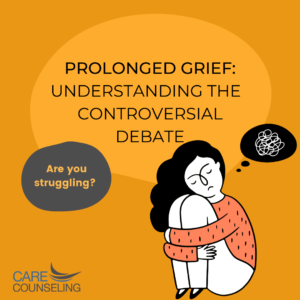 The experience of grief is an undeniable part of the human condition. Losing a loved one can be emotionally devastating, and the healing process can take a considerable amount of time. While grief is a natural response to loss, there is an ongoing debate among mental health professionals about whether prolonged grief should be considered a disorder. In this blog post, we will explore the concept of prolonged grief, its symptoms, the arguments for and against its classification as a disorder, and the importance of finding a balanced perspective.
The experience of grief is an undeniable part of the human condition. Losing a loved one can be emotionally devastating, and the healing process can take a considerable amount of time. While grief is a natural response to loss, there is an ongoing debate among mental health professionals about whether prolonged grief should be considered a disorder. In this blog post, we will explore the concept of prolonged grief, its symptoms, the arguments for and against its classification as a disorder, and the importance of finding a balanced perspective.
Defining Prolonged Grief
Prolonged grief, also known as complicated grief or prolonged grief disorder, refers to an intense and prolonged mourning process that extends beyond what is typically expected. It is characterized by persistent and debilitating symptoms, such as intense yearning, difficulty accepting the loss, and a sense of meaninglessness in life. Unlike the natural process of grief, prolonged grief can significantly impair an individual’s functioning and quality of life.
The Arguments for Prolonged Grief as a Disorder
- Diagnostic Validity: Proponents of classifying prolonged grief as a disorder argue that having a specific diagnosis can help identify individuals who require targeted interventions. By recognizing prolonged grief as a distinct mental health condition, clinicians can provide appropriate support and treatment, potentially preventing further complications.
- Prevalence and Impact: Research suggests that a significant proportion of bereaved individuals experience prolonged grief. By acknowledging it as a disorder, society can gain a better understanding of the extent of the problem and allocate resources for effective interventions. Furthermore, prolonged grief has been linked to various negative outcomes, including increased risk of physical health problems and suicide, underscoring the importance of early identification and treatment.
The Arguments Against Prolonged Grief as a Disorder
- Pathologizing Normal Grief: Critics argue that labeling prolonged grief as a disorder pathologizes a natural human experience. Grief is a complex emotional process that varies among individuals, and attempting to standardize it through diagnostic criteria may oversimplify and medicalize a normal response to loss.
- Lack of Consensus: Another challenge in classifying prolonged grief as a disorder is the absence of consensus among researchers and clinicians regarding its diagnostic criteria. Critics argue that the lack of clear boundaries and universal agreement on symptom duration and severity makes it difficult to distinguish between normal and prolonged grief.
Finding a Balanced Perspective
The debate surrounding prolonged grief highlights the need for a balanced perspective. Acknowledging the existence and potential severity of prolonged grief while considering its context and individual differences is essential. Here are a few key points to consider:
- Flexibility in Diagnosis: Instead of rigid diagnostic criteria, adopting a flexible approach can be beneficial. Recognizing the potential for prolonged grief without rigidly labeling it as a disorder allows mental health professionals to better tailor interventions to individual needs.
- Culturally Sensitive Approach: Different cultures have diverse mourning practices and beliefs about death. It is important to account for cultural variations when assessing grief responses. Cultural competency in mental health care can help professionals navigate the complexities of grief across different communities.
- Supportive Interventions: Regardless of the diagnostic label, providing support to individuals experiencing prolonged grief is crucial. Therapy, support groups, and other interventions can help bereaved individuals navigate their grief and find healthy ways to cope with loss.
The question of whether prolonged grief should be classified as a disorder remains a topic of ongoing debate. While recognizing prolonged grief as a distinct condition can help identify those in need of targeted interventions, concerns about pathologizing a normal human experience and the lack of consensus on diagnostic criteria must be considered. Striking a balance between acknowledging the severity of prolonged grief and recognizing the individuality and contextual factors involved is crucial. By fostering a nuanced understanding and providing appropriate support, we can help individuals navigate the complex journey of grief and facilitating healing.
We’re Here to help
Our wellness experts will be happy to take care of you. You can CLICK HERE to schedule an appointment now or call (612)223-8898.
Meet Clinicians
We’re united by our commitment to providing effective, relevant, and innovative mental health support at all stages of your journey. Click Here to find a therapist or find out more about who we are, where we come from, and how we live out CARE’s mission every day.
The professionals at CARE are actively collecting and creating resources to help with what you need and address frequently asked questions. We’re Here for You.



